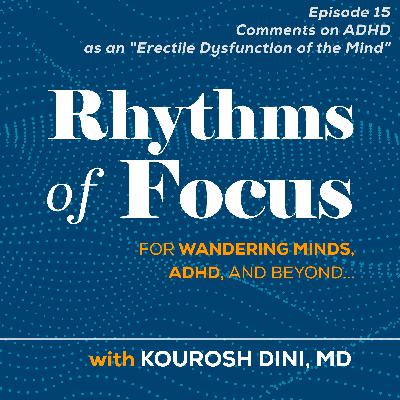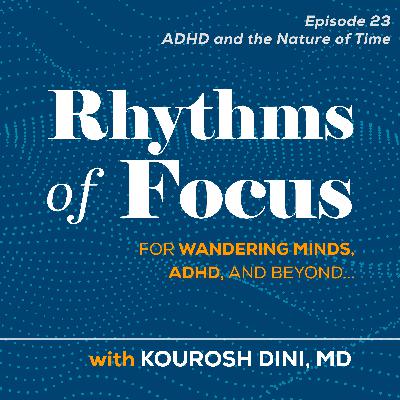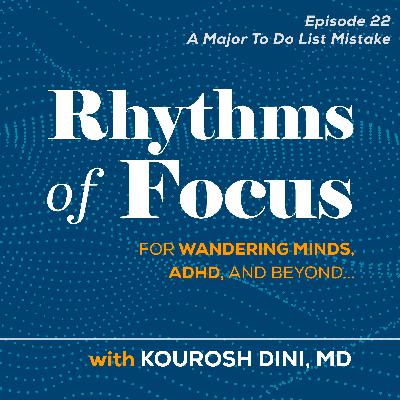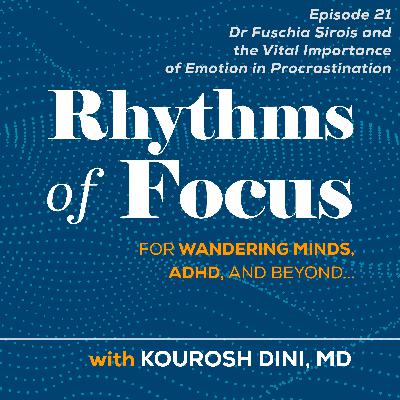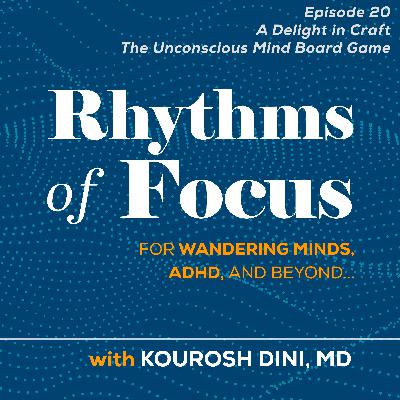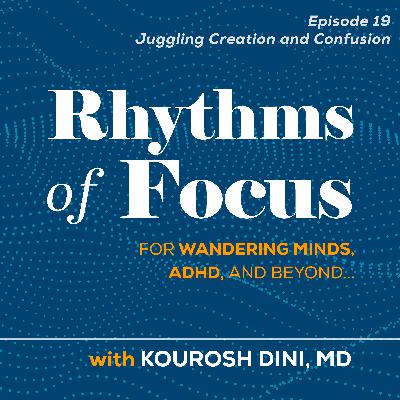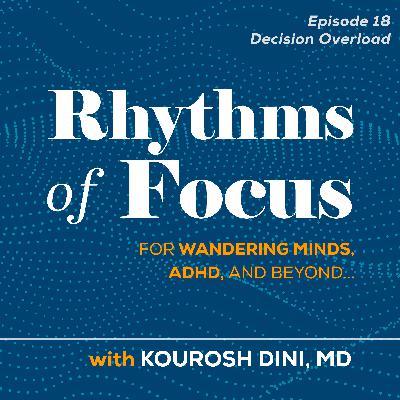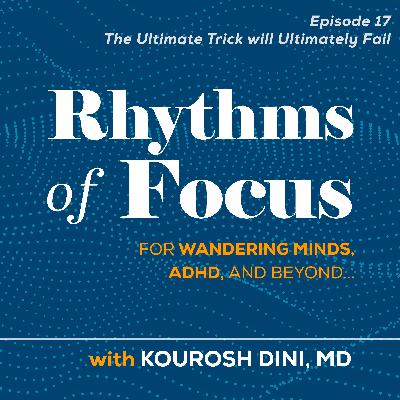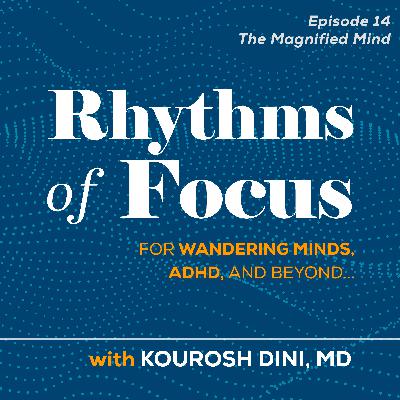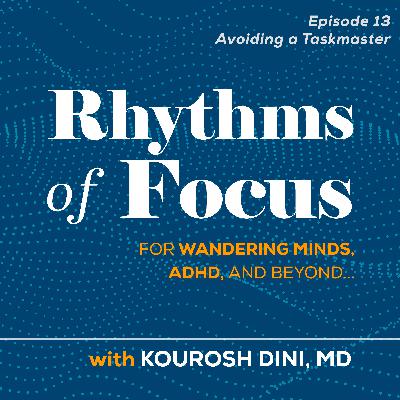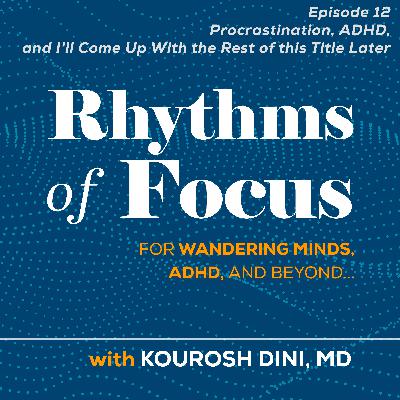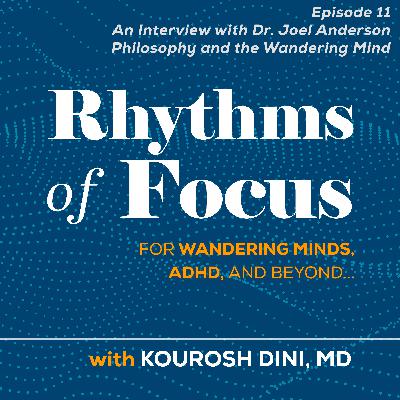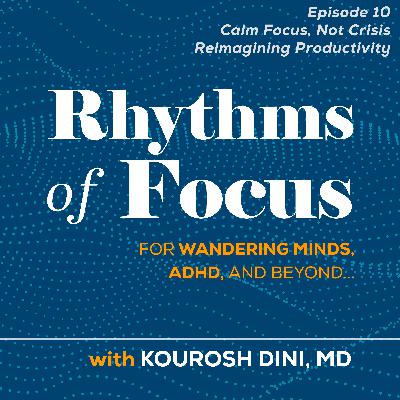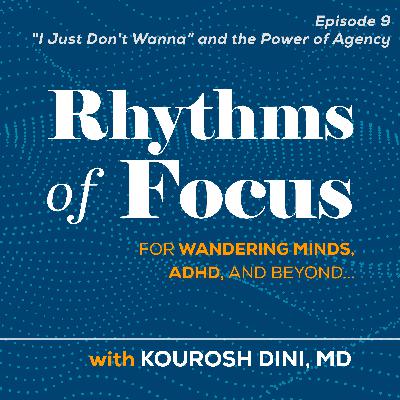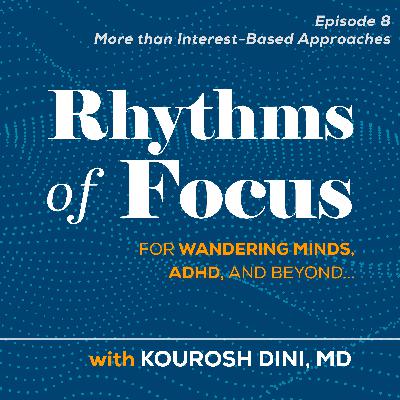Comments on ADHD as an "Erectile Dysfunction of the Mind"
Description
Episode Summary
In this episode, Dr. Kourosh Dini challenges the limits of “chemistry-only” explanations and explores the deeper rhythms of agency and engagement. Drawing on Dr. Thomas Brown’s vivid metaphor—ADHD as “erectile dysfunction of the mind”—we ask: What if the real key isn’t willpower, but the mindful cultivation of agency and self-trust?
Listeners will learn:
- Why “willpower” is a problematic concept for wandering minds.
- How agency differs from willpower and why it matters for daily life.
- The power of “the daily visit” as a compassionate practice to nudge forward on tasks, even when motivation feels absent.
- How emotional waves and environmental supports can be harnessed to create meaningful engagement.
- Why practice is more about care than force, and how to honor both present and future selves in the process.
The episode closes with a personal reflection on the role of music and meaning, featuring Beethoven’s Pathetique as a metaphor for settling into rhythms of focus.
References & Resources Mentioned
- Dr. Thomas Brown’s metaphor:
- (Referenced in the episode introduction.)
- Instagram post quote: “The ADHD brain isn’t lazy or undisciplined. It’s wired to need stronger stimulation to maintain focus.”
- Episode 4: Introduction to the “daily visit” practice.
- Episode 9: Deep dive into the concept of “injured agency.”
- Episode 14: Previous metaphor of the magnified mind and emotional waves.
- Karl Haas & Adventures in Good Music: (link) Inspiration for the musical closing and reflection on the power of loving one’s craft.
- Beethoven’s Pathetique: Featured musical piece at the end of the episode.
Tags
- ADHD
- Agency
- Willpower
- Daily Visit Practice
- Emotional Regulation
- Productivity
- Self-Compassion
- Focus Strategies
- Neurodiversity
- Musical Metaphors
Listener Invitation
Have you tried the “daily visit” approach? What helps you nudge forward when motivation is low? Share your experiences or questions by replying to this episode or connecting on social media.
Music for this episode: Beethoven’s Pathetique, performed by Dr. Kourosh Dini.
For more resources, exercises, and community support, visit the Waves of Focus course page or explore the Letters of a Wandering Mind series.
Transcript
Open
I refuse to believe that any science would tell me I have no free will. The slippery slope of victimhood can plague the science of ADHD Because once again, I've seen the statement.
"I do not have the interest. Therefore, I could not do it."
A Metaphor of ADHD as Erectile Dysfunction
Dr. Thomas Brown, an important voice in the ADHD community recently described it as an "erectile dysfunction of the mind." Let me play the clip for you here.
Certainly the sexual nature of the metaphor is exciting. There's something immediately and viscerally engaging about it. There's a useful sentiment in there, but there's also the possibility of a slippery slope that could be used against ourselves to advocate the sort of victimhood and helplessness, this trouble of actively doing something for ourselves.
So I want to take this apart and see where we can use its ideas without trapping ourselves.
An Over-Focus on "Chemistry"
An important caution in the statement that's made is perhaps the conclusion that the problem is one of chemistry. The implication is that it's that the only valid perspective for wandering mind's difficulties, and when it comes to our sense of agency, our ability to decide and engage something, I would much rather prefer to at least entertain the notion that other potential perspectives exist.
There's a spoiler warning here. I believe they do.
We can look at the entire universe through the lens of chemistry.
So much of our existence can be seen through carbon, hydrogen, oxygen, as these are bonded, taken apart, and rearranged. But even here, within this one perspective, it starts to invite other perspectives. We see the windows to other places. Smaller and larger.
On the smaller side, of carbon, hydrogen, and oxygen -these are atoms. Within atoms, we're talking electrons and their orbitals, neutrons, protons. Smaller, yet we can go to quarks: up, down charm, strange. We can go to the forces that are involved of weak, strong electromagnetic can throw in gravitational.
We're here at the level of physics now. In this way, chemistry and physics are something of an artificial distinction. Chemistry being more of an epiphenomenon of physics.
But we could also go larger from chemistry to biology. For instance, we have molecules and ions that construct the bilipid layers of our cells, each one with gates and channels that leverage cycles of osmosis on one side and active shoving of ions through another set of channels, powered by adenosine tri phosphate in the right key of an enzyme.
Larger yet organs, blood, skin, thyroid, kidneys. One of my favorites is the brain, but why stop there?
There's a larger phenomena yet, which to me seems pretty important. Our existence. Meaning, story, day- to- day, the mind.
To make a metaphor, we have the components of our violin: strings, tuning, the wood, how it's constructed.
These are all important.
But I want to make and hear music. In fact, I wanna make enjoyable, meaningful music. And when we cannot hear it or make it, there might be a problem, certainly with the violin. It could be, it could be a crack in the wood, maybe there's a broken string. Maybe it's out of tune, but maybe just maybe there's some form of practice that could help us write or play a lovely piece.
Interestingly enough, within the text of the Instagram post itself was an important statement:
"the ADHD brain isn't lazy or undisciplined. It's wired to need stronger stimulation to maintain focus."
The stronger the emotion, the more aligning it is. This can be true for anyone, wandering mind or otherwise, but it can be particularly helpful for a wandering mind in the sense that it can create the sort of emotional wave that we can ride.
Or in the metaphor of the magnified mind that I gave in episode 14, it can help us create this consistency in our short-term memory, this sort of peripheral strength to the lens of awareness, this bed on which our consciousness can better rest, that helps to stabilize our vision, reduce distractibility, and then engage us.
Doing the dishes, an often considered aversive task for the wandering mind, can be every bit as complex as creating a piece of music, an epiphenomena of many things.
Not only in a complexity of motion, but sometimes even in the emotions we confront as we stand at the edge of the sink.
"I can't believe I can't do this. I know how to do this. I don't want to do this."
Just as there are many possibilities to how we might not be able to play a piece that we'd like, there are many paths by which we might arrive at this wandering mind from the curious to the brilliant, to the hurt, to the anxious, to the concerned, to the artistic and well beyond.
Chemistry as Abandoning Free Will
Now there's a second trouble that I have with this word "chemical," which is the same that I have with "dopamine" or "norepinephrine," in that it can quickly become this metaphor of having no free will, that the only way to make things happen is to access it using this method that is outside of our experience.
And I refuse to believe that we have no free will.
Now, to be fair, he did not use the phrase "free will," but he did use a very parallel word "willpower," which itself is a terribly problematic word.
As the best as I can understand it, willpower means being able to do something that we would otherwise not want to do, implying that there is some form of force involved.
Now, there's some troubles with this point of view.
First missing is that there are multiple emotional fields at play.
For example, in order for this scenario itself to exist in which we're, let's say, complaining that we don't want to do the dishes, there's some part of us that says, "I do wanna do the dishes." Otherwise we wouldn't even be having this conversation. Now, certainly there's another part, perhaps huge and outweighing the first part that says, "I don't want to."
But again, it's only a part.
Even the very analogy of erectile dysfunction can be tremendously complicated. Certainly there are illnesses, certainly there's age, these can have an effect, but there are also times where a man can have trouble performing with his wife, but get quite excited when it comes to their colleague at work.
To write off that there might be something psychological going on disconnects us from

